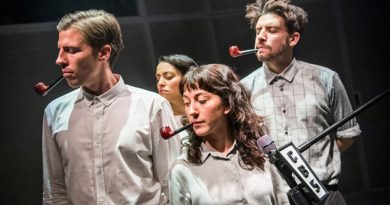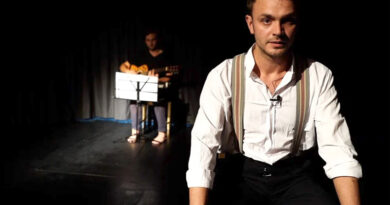Student Theatre Festival Stara Zagora
Former Moscow critic-correspondent John Freedman, who has contributed articles to both Plays International and Plays International & Europe, was a member of the jury of the Festival of Student Drama in Stara Zagora, Bulgaria in 2019. The performances were of an amazingly high standard he believes and this article serves as a means of disseminating knowledge about the festival and encouraging future student contributions from around the world.
John Freedman on the Festival of Student Theatre in Stara Zagora, Bulgaria
1 December 2019
Six women who are friends, a tragedy, and the compulsion to extract hope from despair: that is the seed that germinated the Danail Chirpansky International Student Theater Festival. Since 2017, the festival has run biannually in the picturesque Bulgarian town of Stara Zagora, two hours east of the capital of Sophia and two minutes from the imposing ruins of a two-thousand-year-old Roman amphitheatre. Its purpose is to give students their first experience performing in an international setting and to encourage them to engage with other cultures, traditions, schools, and styles of work even before they turn professional.
Danail Chirpansky was a popular, talented Bulgarian actor whose life was cut short tragically in an automobile accident. Devastated by the loss, six of his former friends and classmates at the National Academy for Theatre and Film Arts resolved to build a living monument to his memory: the first Bulgarian festival featuring student productions from theatre academies throughout Europe and the world.
“Dani may not have been a celebrity, but he changed the life of many people with his perseverance, tireless dedication, constant striving for perfection, courage, human understanding and love that he passed on to those around him” is what the founders posted on the festival’s website (http://istfestbg.com/en/home-3/).
The website continues, “Since we didn’t want to allow such a rare and precious presence to leave us, we decided that in his memory we would start a tradition inspired by him and his dreams and turn it into an event which would help other young students realize their potential. Our aim is to give them the inspiration that our beloved friend possessed.”
The first two festivals – in 2017 (supported by a grant from UNESCO’s International Fund for the Promotion of Culture) and in 2019 – each hosted seven performances by students from Greece, Spain, Russia, Georgia, the UK, Israel, Poland, North Macedonia and Bulgaria. The jury chair in 2017 was the renowned Russian director Kama Ginkas. The acclaimed Bulgarian theatre and film director Javor Gardev chaired the jury in 2019.
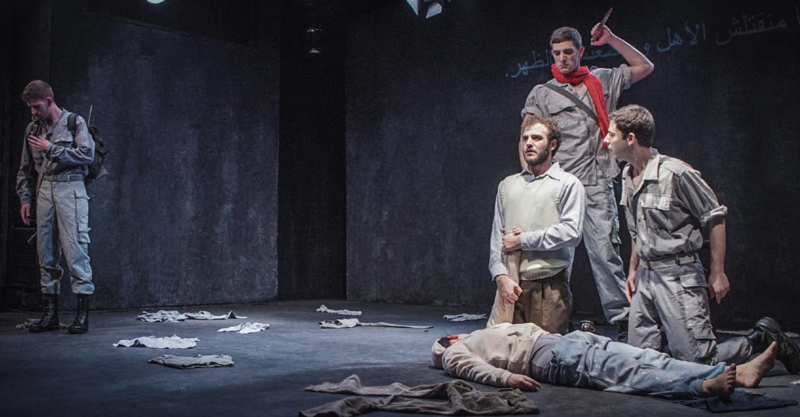
Cast members of Murder.
Photo courtesy of Faculty of Arts, Tel Aviv University.
The Chirpansky Festival is much more than just a few days of shows. In fact, what happens before and after the performances is what makes this endeavour unique. The festival offers visiting students the opportunity to attend master classes and lectures with world-class directors, actors, musicians, and more. Over the course of past festivals, students have worked on honing their on-stage musical instincts with French musician and composer Miquèu Montanaro; incorporating contemporary dance into their performative repertoire with Stefan Vitanov or Violeta Vitanova; attended lectures on performance theory or practical acting experience by scholar Dessislava Stoitcheva or actress Oksana Mysina; and engaged in open-ended question-and-answer sessions with professional directors, critics, and scholars.
A unique and crucial aspect of the festival is that all visiting groups are supported in residence for the full festival run, making it possible for everyone to see the work of all their foreign colleagues and to share their experiences with each other. Requests from student groups intending just to arrive, perform, and leave are rejected. The notion of closely shared experience in one specific common space over a period of time is a fundamental aspect of the festival’s philosophy.
l participated in the 2019 festival as a juror, along with Gardev and French director and actor Thierry Harcourt. Each of us came away convinced we had experienced something out of the ordinary. The founders Mirena Kerezova, Mila Lyutskanova, Veneta Angelkova, Yoanna Temelkova, Teodora Lazarova, and Nikeya Petrova offered plenty of enthusiasm, to be sure, but the week-long event was so much more than enthusiasm. The energy level, the quality of work, the meticulous organization, the professional focus, and the ever-present good will set this festival apart from many that I have attended over the years. Participants, and not only the students, seemed to swim in a sea of generosity, camaraderie, and creativity.
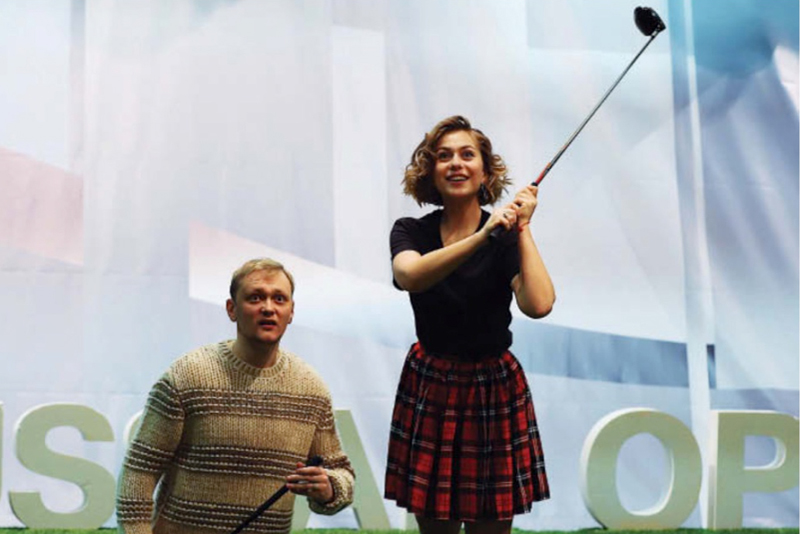
Cast members in Money to Burn.
Photo courtesy GITIS Russian Institute of Theatre Arts.
The 2019 festival opened with Dejan Dukovski’s Who the Fuck Started All This? performed by the Faculty of Dramatic Arts, Ss Cyril and Methodius University of Skopje, North Macedonia. Dukovski’s highly acclaimed play about love and violence and hope and despair existing in close proximity, virtually side-by-side, in the modern world was presented in a kind of cosmic, otherworldly space that accentuated the dehumanizing forces facing young people today. Next up was the Polish National Film, Television and Theatre School from Lodz. The students performed a piece called Fever, the authorship of which was attributed to director Mariusz Grzegorzek, but which, if correctly understood the students, was largely built on études created by the young actors themselves – based, of course, on their instructor’s suggestions. The piece incorporated music, dance, and parody in a frenetic performance that skewered everything from stardom to the news media.
The GITIS Russian institute of Theatre Arts offered up a modernized version of Alexander Ostrovsky’s classic nineteenth-century comedy Money to Burn. Dressed in colourful contemporary clothes, and often engaging in games of golf, the young actors performed Ostrovsky‘s tale of traditional values running up against greed and selfishness in a light, breezy manner.
The local entry from the Bulgarian National Academy for Theatre and Film Arts was a rendition of Hanoch Levin’s popular The Suitcase Packers. Moving and well-acted, it beautifully told the story of hapless, lovable people always desiring to strike out for a better life but rarely having the nerve, smarts or wherewithal to do so.
Another play by Hanoch Levin was on tap the following evening as performed by students of the Faculty of Arts, Department of Theatre Arts of Tel Aviv University, Israel. Only this time instead of a contemporary classic, it was one of Levin’s most controversial plays to date, Murder. It is so controversial in Israel that it is almost never performed. It tells the difficult story of a cycle of violence that begins with the murder of an Arab boy, moves on to the murder of a Jewish couple on their wedding day, and ends with another murder, this time of an Arab construction worker. The cast handled the complex material with dignity, directness, and simplicity.
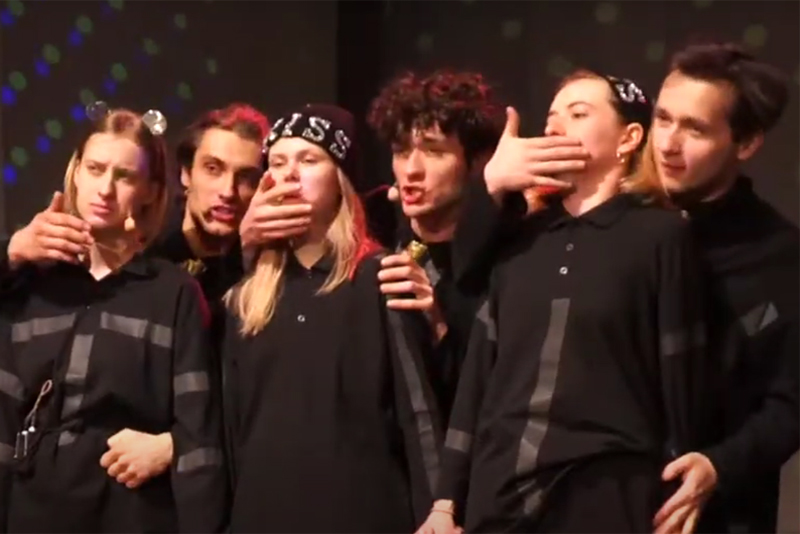
Fever. Polish National Film, Television and Theatre School, Lodz.
The final performance, offered up outside the competition, featured students from the London College of Music in a “punk musical” exploring alienation and political violence, written and composed by Dylan Summers.
Some of the festival’s finest moments for me were those in which l had the opportunity to engage with the student actors. All were pleased to be representing their countries’ theatre traditions abroad, but their thoughts went much further and deeper than that.
During a private conversation, two actors from the Israeli company (Anan Abu-Jabir and Aviv Zalishansky) spoke of the honour they felt in bringing Hanoch Levin’s most controversial play to life, and, therefore, publicly to address a topic that is nearly considered taboo in Israel. For them, the opportunity to take the performance abroad gave their choice added gravitas. Both affirmed it was important for them to stand up before the world and say, “This is part of our experience, too.”
During a full-group discussion several students of the Ss Cyril and Methodius University of Skopje described how Dejan Dukovski, one of North Macedonia’s most famed and beloved playwrights, had come to discuss his play in person with them during rehearsals; that was an experience they expected would stay with them for the rest of their lives. For them, the opportunity to revive the show before an international audience lent even more value to the event.
In a late-night chat, Dalibor Buranda, a student of the London College of Music who had emigrated from Slovakia to the UK in order to follow his dream of acting in musical theatre, told me how much it meant to him to return to Central Europe already well on the way to making that dream a reality.
All of these comments – served as reminders of the value of international work, especially in the lives of young people taking their first steps in their profession. Lessons learned in Stara Zagora will resonate for many decades in many countries of the world.




